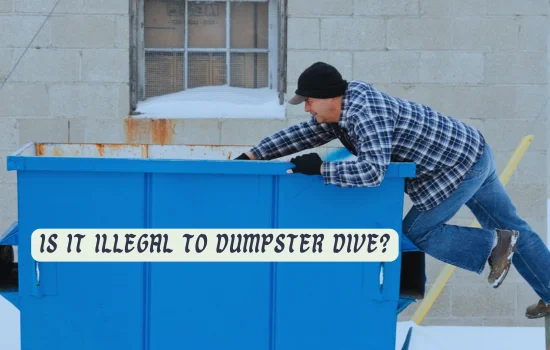If you are one of those who is living in Pennsylvania which is well abbreviated as PA and wanted to know whether Is It Illegal or not to Dumpster Dive in PA? Then the answer is No, The dumpster diving is practice of retrieving discarded items from waste containers—exists in a nuanced legal landscape across the United States, including Pennsylvania.
While the U.S. Supreme Court’s 1988 decision in California v. Greenwood established that searching through trash is not inherently illegal, various state and local regulations, as well as property laws, significantly influence the legality of dumpster diving.
State Law in Pennsylvania

In Pennsylvania, no state law explicitly prohibits dumpster diving. This means that, at the state level, individuals are not barred from scavenging through waste disposed of in public areas. However, this does not grant unrestricted freedom to dumpster dive anywhere within the state. Local ordinances, property rights, and specific circumstances play pivotal roles in determining the legality of such activities.
Local Ordinances and Trespassing Concerns
Municipalities within Pennsylvania may have their own regulations regarding waste collection and scavenging. For instance, some cities might classify dumpster diving as a public nuisance or impose fines for unauthorized removal of waste. It’s essential to consult local laws to ensure compliance.
Trespassing remains a significant concern. Many dumpsters are located on private property, such as behind businesses or within gated areas. Accessing these dumpsters without permission can lead to trespassing charges, regardless of the legality of dumpster diving itself. As noted by Ream’s Disposal, “dumpster diving in such areas falls under trespassing, which comes with different legal implications.”
Health and Safety Regulations
Beyond legal considerations, health and safety are paramount. Dumpsters can contain hazardous materials, spoiled food, or sharp objects, posing risks to individuals rummaging through them. Engaging in dumpster diving without proper precautions can lead to injuries or health issues. Moreover, businesses may face liabilities if individuals are harmed while on their property without authorization.
Notable Legal Case: The Lebanon Incident
A pertinent case highlighting the complexities of dumpster diving in Pennsylvania occurred in 2016. Two individuals in Lebanon were arrested for dumpster diving behind a CVS pharmacy and charged with loitering, prowling at night, and criminal trespassing. The dumpster was neither locked nor marked with “No Trespassing” signs, yet the individuals faced legal action. This incident underscores that, even in the absence of explicit prohibitions, dumpster diving can lead to legal challenges, especially concerning property rights and perceived suspicious behavior.
Guidelines for Responsible Dumpster Diving
For those considering dumpster diving in Pennsylvania, adhering to the following guidelines can help mitigate legal risks:
1. Research Local Laws: Before engaging in dumpster diving, familiarize yourself with municipal ordinances and regulations. Some cities may have specific rules against scavenging or unauthorized waste removal.
2. Seek Permission: When possible, obtain consent from property owners or businesses before accessing their dumpsters. This not only reduces the risk of trespassing charges but also fosters goodwill.
3. Avoid Restricted Areas: Steer clear of dumpsters located within fenced properties, behind locked gates, or marked with “No Trespassing” signs.
4. Prioritize Safety: Use appropriate protective gear, such as gloves and sturdy footwear, to minimize health risks. Be cautious of hazardous materials or sharp objects that may be present.
5. Respect Property: Ensure that the area around the dumpster remains clean and undisturbed. Leaving a mess can lead to complaints and potential legal action.
Conclusion
While dumpster diving is not explicitly illegal in Pennsylvania, it exists within a framework of property rights, local ordinances, and safety considerations. Individuals interested in this activity should approach it with caution, respect for laws and property, and an awareness of potential health risks. By doing so, they can navigate the complexities surrounding dumpster diving and minimize the likelihood of legal complications.

